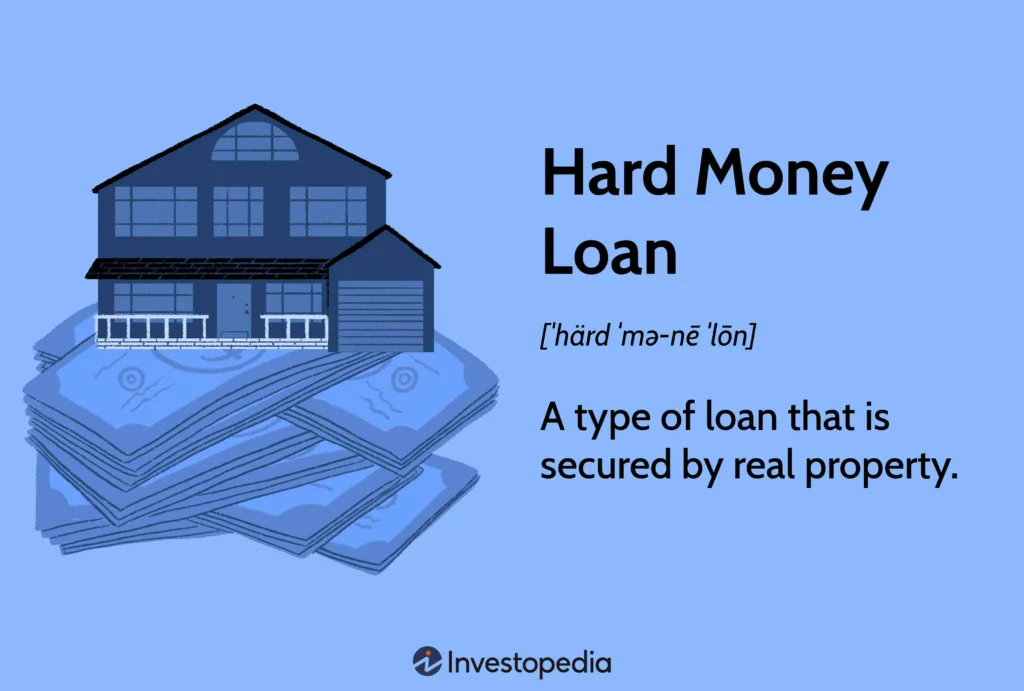Hard money loans have gained popularity in the real estate market due to their quick approval process and flexible terms. However, potential borrowers often wonder if there are any specific insurance requirements for these types of loans. In this article, we will explore the insurance obligations in hard money lending and provide a comprehensive understanding of what borrowers need to know regarding insurance coverage for such loans. Whether you are a borrower or an investor interested in hard money lending, it is crucial to be well-informed about the insurance obligations to protect yourself and your investment.
What Are Hard Money Loans?
Definition of Hard Money Loans
Hard money loans are a type of financing that is typically provided by private investors or companies, rather than traditional banks or lending institutions. These loans are secured by real estate and are often used by borrowers who are unable to qualify for conventional loans due to factors such as poor credit history, lack of income documentation, or the need for a quick funding solution.
How Hard Money Loans Work
Unlike traditional loans, hard money loans are generally based on the value of the collateral property rather than the borrower’s creditworthiness or income. When applying for a hard money loan, the borrower typically provides information about the property they plan to use as collateral, including details such as its appraised value and any outstanding liens or encumbrances.
The lender then evaluates the property and determines the loan amount based on a percentage of its value, commonly referred to as the loan-to-value (LTV) ratio. This percentage can vary depending on factors such as the location and condition of the property, as well as the borrower’s experience and track record.
If the borrower is approved for the loan, they will need to sign a promissory note, which outlines the terms and conditions of the loan, including the interest rate, repayment schedule, and any fees or penalties. Once the loan is funded, the borrower will typically have a fixed period to repay the loan, usually ranging from a few months to a few years.
Why Borrowers Choose Hard Money Loans
There are several reasons why borrowers may choose to apply for a hard money loan:
-
Speed: Hard money loans are known for their quick approval and funding process, making them an attractive option for borrowers who need financing urgently or are looking to take advantage of time-sensitive investment opportunities.
-
Flexible Qualifications: Unlike traditional loans, hard money lenders are primarily concerned with the value of the collateral property rather than the borrower’s financial history. This can be beneficial for borrowers who have less-than-perfect credit or are self-employed and have difficulty providing income documentation.
-
Asset-Based Lending: Hard money loans are considered asset-based loans since they are secured by real estate. This can provide borrowers with access to capital based on the value of their property, regardless of their personal financial situation.
-
Investment Opportunities: Hard money loans are often used by real estate investors to fund property acquisitions, renovations, or other investment projects. These loans can enable borrowers to capitalize on lucrative opportunities that may not be available through traditional financing.
The Importance of Insurance in Hard Money Loans
Understanding Insurance Requirements
Insurance plays a crucial role in hard money loans, both for lenders and borrowers. The primary purpose of insurance in this context is to protect the interests of all parties involved and mitigate potential risks. Hard money lenders typically require borrowers to obtain various types of insurance coverage to ensure the protection of the collateral property and minimize potential losses.
Protecting Lenders’ Interests
From a lender’s perspective, insurance is essential for protecting their investment in the collateral property. In the event of damage or loss, insurance can provide financial compensation to the lender, helping to recover their principal and ensuring a certain level of recovery in case of default. Without adequate insurance, lenders may be at a higher risk of incurring substantial financial losses.
Mitigating Risks for Borrowers
Insurance also benefits borrowers by providing a safety net in case of unforeseen circumstances or emergencies. By having insurance coverage, borrowers can mitigate the risks associated with potential property damage, liability claims, or other events that could negatively impact their ability to fulfill the loan obligations. Having insurance coverage can help borrowers avoid personal financial hardships and ensure that their investment is safeguarded.

Property Insurance
Coverage for the Collateral Property
Property insurance is one of the most crucial insurance requirements for hard money loans. It provides coverage for the collateral property against various perils, such as fire, theft, vandalism, and natural disasters. The insurance policy will outline the specific risks covered and the extent of compensation provided in case of damage or loss.
Property Insurance Requirements for Hard Money Loans
Hard money lenders typically require borrowers to obtain property insurance that meets certain minimum requirements. These requirements may include:
-
Adequate Coverage Amount: The insurance policy should provide coverage that is equal to or greater than the appraised value of the collateral property. This ensures that the lender’s investment is adequately protected.
-
Named Lender as Additional Insured: The lender should be listed as an additional insured party on the policy. This allows them to receive direct notifications of any policy changes or cancellations.
-
Loss Payee Clause: The lender should be listed as the loss payee on the policy, meaning that in the event of a claim, the insurance proceeds will be paid directly to the lender to ensure repayment of the loan.
Determining the Coverage Amount
The coverage amount required for property insurance will vary depending on factors such as the location, size, and value of the collateral property. It is essential for borrowers to work with their insurance agent or broker to determine the appropriate coverage amount based on the appraised value and any potential risks associated with the property.
Title Insurance
Importance of Title Insurance
Title insurance is another critical requirement in hard money loans, as it provides protection against any defects or issues with the property’s title. A clear title is essential for both lenders and borrowers, as it ensures that the property can be legally transferred and serves as collateral for the loan.
Title Insurance Requirements for Hard Money Loans
Hard money lenders typically require borrowers to obtain an Owner’s Policy of Title Insurance to protect against any potential title defects or claims. The title insurance policy will investigate the history of the property’s ownership, liens, and encumbrances, ensuring that the title is clear and marketable.
Verifying Clear Title
Before approving a hard money loan, lenders will review the title insurance policy and verify that the property’s title is clear of any issues that could impact the borrower’s ability to repay the loan. This step is crucial for lenders to mitigate the risk of potential legal disputes or claims that could jeopardize the loan’s security.

General Liability Insurance
Coverage for Personal Injury or Property Damage
General liability insurance is designed to protect against claims or lawsuits arising from personal injuries or property damage that may occur on the collateral property. This type of insurance provides coverage for medical expenses, legal fees, and damages awarded in case of a covered incident.
General Liability Insurance Requirements for Hard Money Loans
Hard money lenders often require borrowers to obtain general liability insurance to protect against potential liability claims. The specific requirements may include:
-
Adequate Coverage Limits: The liability insurance policy should have sufficient coverage limits to protect both the borrower and the lender in case of a claim. The limits may depend on factors such as the property’s use (residential or commercial) and the nature of the potential risks involved.
-
Additional Insured Endorsement: The lender should be listed as an additional insured on the policy, allowing them to receive direct notifications and ensuring that their interests are protected.
Ensuring Sufficient Coverage
To determine the appropriate coverage limits for general liability insurance, borrowers should assess the potential risks associated with the collateral property, such as its condition, location, and the activities conducted on the property. Working with an insurance professional can help borrowers identify the necessary coverage and ensure that they are adequately protected against potential liability claims.
Fidelity Bond Insurance
Protection Against Employee Dishonesty
Fidelity bond insurance, also known as crime insurance, provides coverage against losses resulting from fraudulent or dishonest acts committed by employees or other insiders. This type of insurance can protect both lenders and borrowers from financial losses caused by acts such as theft, forgery, or embezzlement.
Fidelity Bond Insurance Requirements for Hard Money Loans
Some hard money lenders may require borrowers to obtain fidelity bond insurance, particularly for larger loan amounts or cases where the collateral property involves multiple parties, such as a commercial property with tenants. The specific requirements for fidelity bond insurance can vary depending on the lender’s risk tolerance and the unique characteristics of the loan.
Verifying Proper Coverage
Borrowers should consult with their insurance agent or broker to determine whether fidelity bond insurance is necessary for their hard money loan. It is essential to carefully review the policy terms and conditions to ensure that the coverage adequately addresses the risks involved and meets the lender’s requirements.

Workers’ Compensation Insurance
Coverage for Work-Related Injuries
Workers’ compensation insurance provides coverage for medical expenses, lost wages, and other benefits to employees who suffer work-related injuries or illnesses. This insurance is crucial for borrowers who have employees working on the collateral property, as it helps protect against potential liability claims and ensures compliance with state laws.
Workers’ Compensation Insurance Requirements for Hard Money Loans
Hard money lenders may require borrowers to provide proof of workers’ compensation insurance if there are employees involved in the renovation, construction, or management of the collateral property. The requirements for workers’ compensation insurance can vary depending on the state laws and the nature of the work being performed.
Ensuring Compliance with State Laws
To meet the workers’ compensation insurance requirements, borrowers should consult with their insurance provider to determine the specific coverage needed based on their employees’ job duties and location. Failing to obtain the required workers’ compensation insurance can not only lead to potential legal and financial liabilities but can also jeopardize the loan funding.
Errors and Omissions Insurance
Protection Against Professional Negligence
Errors and omissions (E&O) insurance, also known as professional liability insurance, provides coverage for claims alleging negligence or errors in rendering professional services. In the context of hard money loans, E&O insurance can protect against claims of negligence in the loan processing and underwriting process.
Errors and Omissions Insurance Requirements for Hard Money Loans
While not always a mandatory requirement, some hard money lenders may require borrowers involved in loan processing and underwriting to carry E&O insurance. The specific requirements for E&O insurance can vary depending on the lender’s risk tolerance and the borrower’s role in the loan transaction.
Verifying Coverage for Loan Processing and Underwriting
Borrowers should consult with their insurance agent or broker to determine whether E&O insurance is necessary based on their involvement in the loan processing and underwriting process. Having proper E&O coverage can provide an added layer of protection against potential claims and demonstrate a commitment to professional standards.

Additional Insurance Requirements
In addition to the aforementioned insurance types, there may be specific insurance requirements depending on the unique characteristics of the collateral property or the nature of the loan transaction. Some of these additional insurance requirements may include:
Insurance for Hazardous Materials or Environmental Risks
If the collateral property involves the handling, storage, or presence of hazardous materials, borrowers may be required to obtain pollution liability insurance. This coverage protects against potential environmental risks and ensures compliance with regulatory requirements.
Insurance for Builders’ Risk or Construction Loans
For borrowers engaged in property construction or renovation projects, builders’ risk insurance may be necessary. This coverage provides protection for the structure and materials during the construction phase, safeguarding against potential losses from perils such as fire, theft, or vandalism.
Insurance for Flood or Earthquake Risks
Properties located in high-risk flood or earthquake zones may require borrowers to obtain specific insurance coverage for these hazards. Flood insurance and earthquake insurance provide protection against the damages and losses caused by these natural disasters.
Insurance for Rental Property or Vacant Property
Borrowers who own rental properties or vacant properties may have additional insurance requirements. Rental property insurance covers risks associated with tenant-occupied properties, while vacant property insurance provides coverage for unoccupied properties that may be more susceptible to certain perils.
It is important for borrowers to thoroughly review their loan agreement and consult with their lender and insurance professionals to determine any additional insurance requirements based on the unique characteristics of their loan transaction and collateral property.
Consequences of Non-Compliance
Failure to comply with the insurance requirements outlined by the hard money lender can have significant consequences for borrowers. Some of the potential impacts of non-compliance include:
Potential Impact on Loan Funding
Non-compliance with the insurance requirements may result in the lender delaying or denying the loan funding. Lenders have a vested interest in protecting their investment, and the absence of adequate insurance coverage increases their risk exposure. Without the necessary insurance in place, lenders may not feel comfortable proceeding with the loan.
Legal and Financial Liabilities
In addition to impacting the loan funding, non-compliance with insurance requirements can result in legal and financial liabilities for both borrowers and lenders. If an unforeseen event or claim occurs and there is no insurance coverage, the affected party may be held responsible for any damages or losses. This can lead to costly legal disputes and potential financial ruin.
Lender’s Ability to Sell or Transfer the Loan
In some cases, lenders may restrict their ability to sell or transfer the loan if the insurance requirements are not met. The absence of adequate insurance coverage reduces the marketability of the loan and can create challenges for lenders in terms of managing their portfolio and mitigating risk.
To ensure a smooth loan process and protect their own interests, borrowers must carefully review and adhere to the insurance requirements outlined by the hard money lender. By working closely with their insurance professionals and ensuring that all necessary coverage is in place, borrowers can mitigate potential risks and demonstrate their commitment to a successful loan transaction.




